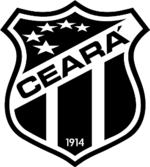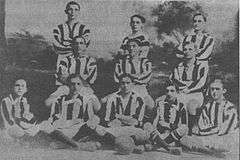Ceará Sporting Club
Ceará Sporting Club, or Ceará, as they are usually called, is a Brazilian football team from Fortaleza in Ceará, founded on June 2, 1914 by Luís Esteves Júnior e Pedro Freire. Ceará is one of the most traditionally successful clubs in the Northeast region of Brazil alongside Bahia, Santa Cruz, Sport, Náutico, Vitória and their city rivals Fortaleza.
 | |||
| Full name | Ceará Sporting Club | ||
|---|---|---|---|
| Nickname(s) | Vozão (Big Grandpa) Vovô (Grandpa) Alvinegro Cearense (Black and White from Ceará) O Mais Querido (The Dearest) | ||
| Founded | June 2, 1914 | ||
| Ground | Castelão, Fortaleza | ||
| Capacity | 63,903[1] | ||
| President | Robinson de Castro | ||
| Head coach | Guto Ferreira | ||
| League | Campeonato Brasileiro Série A Campeonato Cearense | ||
| 2019 | Série A, 16th | ||
| Website | Club website | ||
|
| |||

History
On June 2, 1914, the club was founded as Rio Branco Football Club by Luiz Esteves Junior and Pedro Freire. Later, some of their friends also joined: Gilberto Gurgel, Walter Barroso, Raimundo Justa, Newton Rôla, Bolívar Purcell, Aluísio Mamede, Orlando Olsen, José Elias Romcy, Isaías Façanha de Andrade, Raimundo Padilha, Rolando Emílio, Meton Alencar Pinto, Gotardo Morais, Artur de Albuquerque, Cincinato Costa, Carlos Calmon and Eurico Medeiros. As Rio Branco Football Club, the team colors were white and lilac. In 1915, on their first birthday, the club changed its name to Ceará Sporting Club.
From 1915 to 1919, Ceará was five time consecutive champion of the Torneios Metropolitanos. In 1941, Ceará won the Campeonato Cearense, the same year of the inauguration of Presidente Vargas stadium. From 1961 to 1963, the club was three times consecutive state champion. In 1969, Ceará won the Northeast Cup.
In 1970, ended the seven-year titleless state championship period. In 1971, Ceará was the last placed team in Campeonato Brasileiro Série A first edition. From 1975 to 1978, the club was four times in a row state champion.
In 1985, Ceará finished 7th in the Brazilian League. This is the best league position of a team from Ceará State in the Brazilian Championships. In 1994, the club finished Brazilian Cup runners-up, beaten by Grêmio in the final. In 1995, Ceará participated in the Copa CONMEBOL, the club's first international championship, becoming the only club of Ceará State to play an international tournament. In 1996, the team administrator was Forró bands businessman Emanuel Gurgel. The team changed its home shirt color to all black. Because of this, the team was nicknamed "Urubu do Nordeste" (Northeast Vulture). From 1996 to 1999, the club was state champion four times in a row .
In 2002, Ceará won the state championship, for the first time in three years. In 2005, Ceará reached the Copa do Brasil semifinals. The club was defeated by Fluminense. In 2006, the club won the state championship after 4 years without winning the competit
In 2010, after a 17-year absence, Ceará was promoted back to the Brazilian League, after finishing third in the 2009 Campeonato Brasileiro Série B. They finished in 12th position, achieving a place in the 2011 Copa Sudamericana.
In 2011, Ceará reached the 2011 Copa do Brasil semi-finals. Ceará ended Ronaldinho's Flamengo's unbeaten streak in the previous round winning the away game, and drew the home game, eliminating the Rio de Janeiro team in a notorious upset. Ceará, however, was defeated by Coritiba in the semi-finals.
Achievements
Football
- 1915, 1916, 1917, 1918, 1919, 1922, 1925, 1931, 1932, 1939, 1941, 1942, 1948, 1951, 1957, 1958, 1961, 1962, 1963, 1971, 1972, 1975, 1976, 1977, 1978, 1980, 1981, 1984, 1986, 1989, 1990, 1992, 1993, 1996, 1997, 1998, 1999, 2002, 2006, 2011, 2012, 2013, 2014, 2017, 2018
- Copa dos Campeões Cearenses: 1
- 2014
- Copa Norte-Nordeste: 1
- 1969
- Runners-up (1): 1994
Stadium

Ceará's home venue is Estádio Carlos de Alencar Pinto, capacity 3,000, but the team also plays at Castelão Stadium which has a capacity of 60,326,[2] and at Presidente Vargas Stadium, which has a 22,228 capacity.
Rivals
Ceará's greatest rival is Fortaleza. It is the biggest derby in Fortaleza city. It has been played 574 times, with Ceará winning 193 times, Fortaleza winning 176 times and 205 draws. [3] Ceará's second biggest rival is Ferroviário, the third biggest club of Fortaleza city. This derby has been played 297 times, with 138 wins for Ceará, 69 wins for Ferroviário and 90 draws. [4]
Mascot
The team mascot, an old man known as "Vovô" ("Grandpa") dressing Ceará uniform was designed by Cearense cartoonist Mino for the "Ceará: Paixão Total" Project ("Ceará: Full Passion" Project).
The team mascot appeared in late 1919, when Meton de Alencar Pinto, former president of Ceará SC, coached young players of America Football Club, a small club from the city, in the Porangabussu training center. Meton, who used to call the kids as "my grandsons", asked them to "go easy on grandpa". Afterwards, the nickname started to apply to the team of Ceará as well, helped by the seniority of the club; Ceará Sporting Club was the first football team founded in the state.
Logo evolution

The first logo was the club's first as Ceará Sporting Club, and was used from 1915–54.
The second logo was used from 1955–69 and was inspired by the Santos logo.
The third logo was used from 1970–03.
The fourth logo is the current team logo, and was adopted in 2003. The logo is a restylized version of the previous logo created by Adman Orlando Mota. This logo introduced the white stars and the foundation date.
First-team squad
- As of 16 March 2020[5]
Note: Flags indicate national team as defined under FIFA eligibility rules. Players may hold more than one non-FIFA nationality.
|
|
Reserve team
Note: Flags indicate national team as defined under FIFA eligibility rules. Players may hold more than one non-FIFA nationality.
|
Out on loan
Note: Flags indicate national team as defined under FIFA eligibility rules. Players may hold more than one non-FIFA nationality.
|
Managers
|
|
Ultras groups
References
- "CNEF - Cadastro Nacional de Estádios de Futebol" (PDF) (in Portuguese). January 18, 2016. Retrieved June 6, 2016.
- "Estádio Castelão". SESPORTE. Archived from the original on October 10, 2008. Retrieved September 12, 2008.
- pt:Clássico-Rei
- pt:Clássico da Paz (Fortaleza)
- "Elenco Profissional". Ceara. Retrieved January 27, 2019.